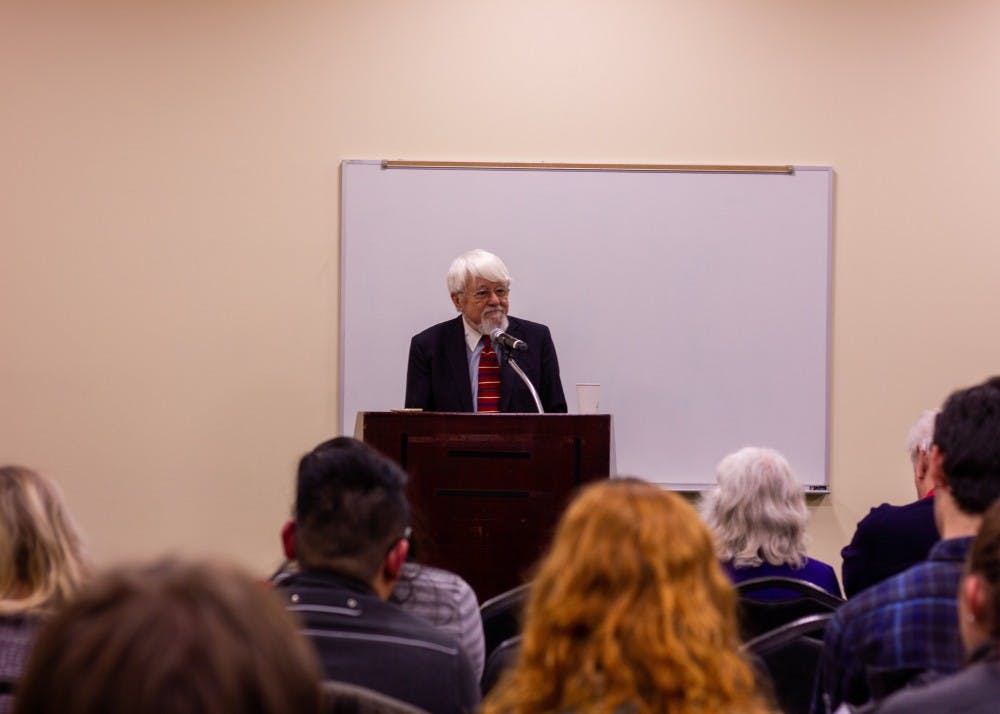As the night fell darker and the snow began to stick outside, attentive eyes watched William Chafe, a history professor at Duke University, describe hundreds of years of history — from the passing of the 14th amendment and the promise of equality for all natural born citizens, to the speech of a black man who had a dream, to the position of existing inequality individuals still face today.
“So we have this ongoing issue, of poverty, of the large number of blacks that are still unemployed, who are being jailed and essentially being denied equal rights,” Chafe said.
To kick-off Black History Month, on Feb. 4, Chafe delivered the annual Mazzocco Lecture to about 30 people in Franz Hall on the history of the Black American struggle for freedom in this country. Chafe shared the history of the civil rights movement, and influential leaders in it who are often lesser known.
“It’s important to start thinking about how far back this goes, and how far forward it goes, including this present day,” Chafe said.
Every year, the Mazzocco Lecture is focused on the concepts around national and international equality. The annual lecture is in honor of William James Mazzocco, a University of Portland graduate in economics in 1937, and advocate for distributive justice.
“They thought he fit the lecture, because our lecture is on justice, and obviously he spent his career studying and promoting racial justice both here and abroad,” said Bill Curtis, associate professor of political science.
Chafe spoke about the history of the hardships the black community has faced across the span of hundreds of years. From the ending of slavery, to the bus boycotts in Montgomery, he referenced figures who had devoted their lives to make progress in the struggle for equality and freedom.
He spoke specifically of Ella Baker, a civil rights activist, whose career greatly propelled the success of the National Association for the Advancement of Colored People (NAACP). Baker was one of the most influential figures in the civil rights movement, and she increased the membership of the NAACP by 500 percent in the span of five years, taking membership from 50,000 to 500,000. She had started youth chapters in the NAACP all over the South.
Chafe also mentioned Bob Moses, another leader who Chafe considered to be one of the most powerful organizers. Chafe said his ability to work bottom up and ability to ask people what they wanted made him impactful. Moses founded the Mississippi Freedom Democratic party, and his work helped to end the violence against colored individuals that the state had faced for many years.
“What I mainly took out of it (the lecture) was the grassroots movements, and all the people we don’t recognize in the civil rights movement, for example like Ella Baker, and how we only really focus on the big names,” junior and social work major Kaylie Haas said.
Haas said she was surprised at first by the fact that a person of color was not giving the lecture, but said he was still an interesting speaker.
Program Manager of the Immersion Program for the Moreau Center Tyler Wagner said he appreciated the insight into activists like Ella Baker and Bob Moses. He said he was also surprised about the ethnicity of the speaker, similar to Haas, but he enjoyed the knowledge that Chafe provided.
Although the U.S. has made progress, Chafe said there is still a long way to go to reach true equality. Chafe referenced the high incarceration rates, saying that 13 percent of the population is black, and yet they take up 38 percent of the incarcerated population.
During the lecture, Chafe emphasized the practice of working bottom up in activist movements, meaning successful leaders ask people how they want to change and don’t tell them how to change. Chafe said that those people make the largest impact.
“We’ve been taught in folk culture to think of America as being a very exceptional place, we are different from everybody else, we are conceived in liberty, committed to equality and opportunity,” Chafe said. “Yet this very focus on our exceptionalism keeps us from examining and recognizing the degree of which this is not the story of our country.”
Austin De Dios is a reporter for The Beacon. He can be reached at dedios22@up.edu.









